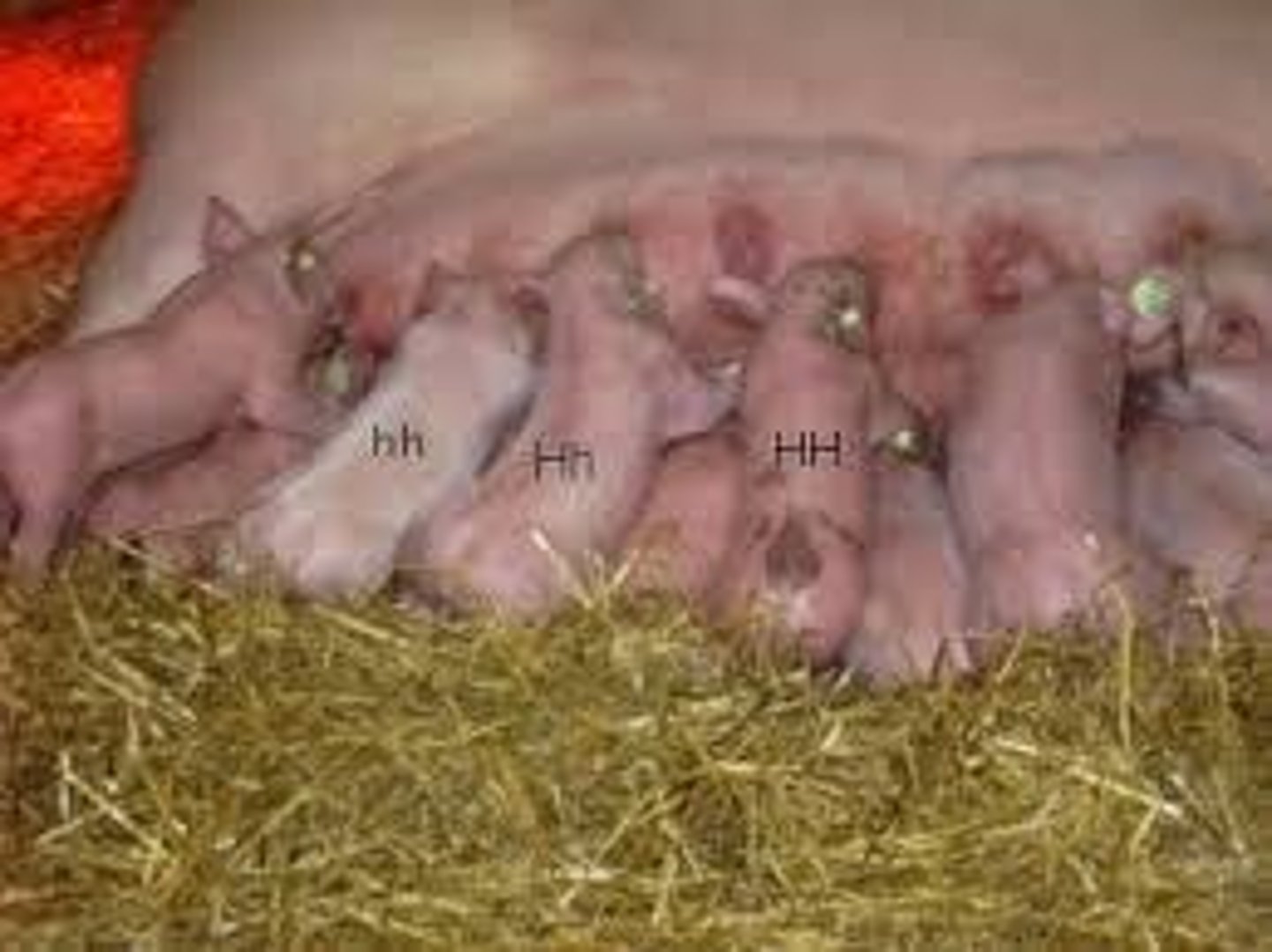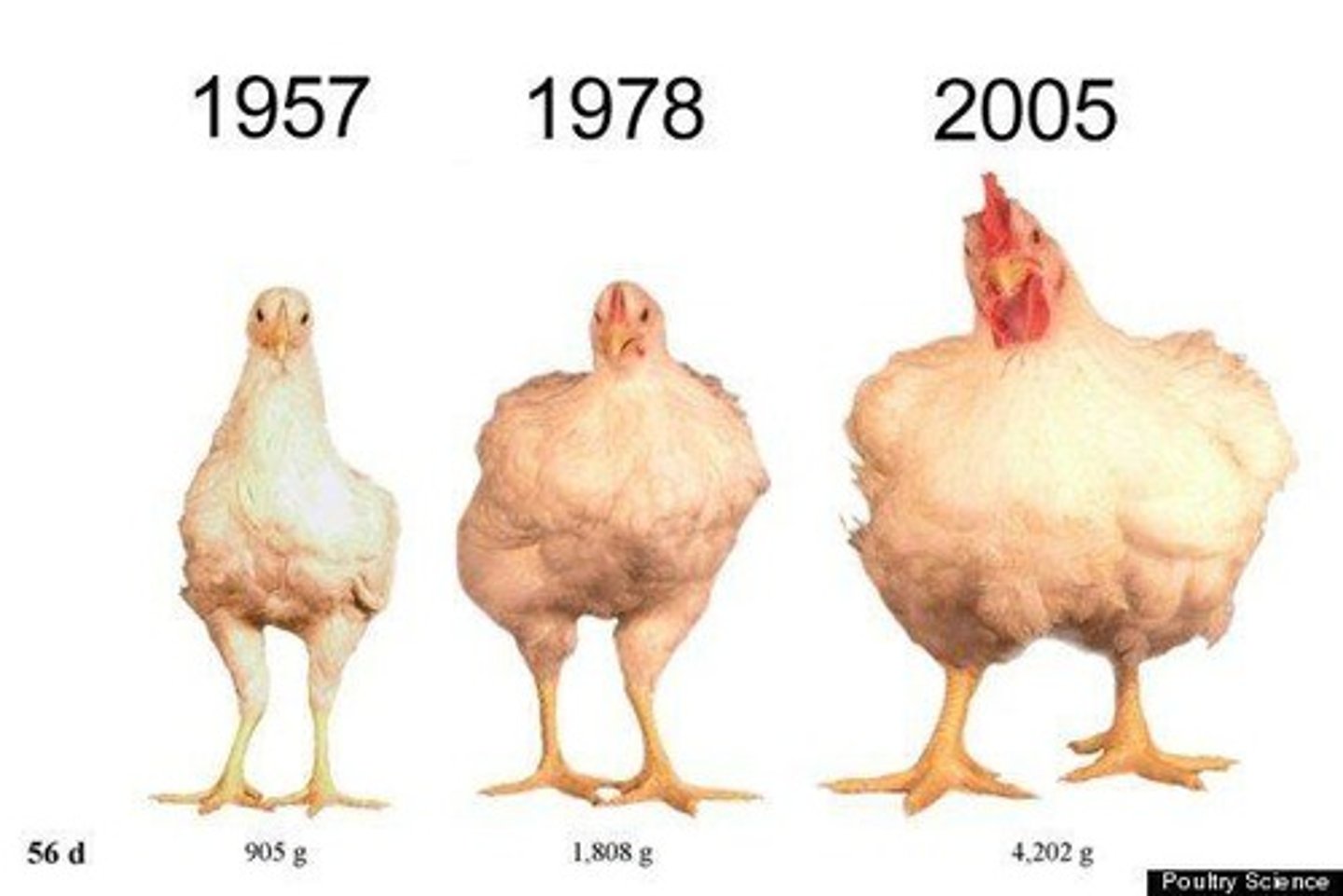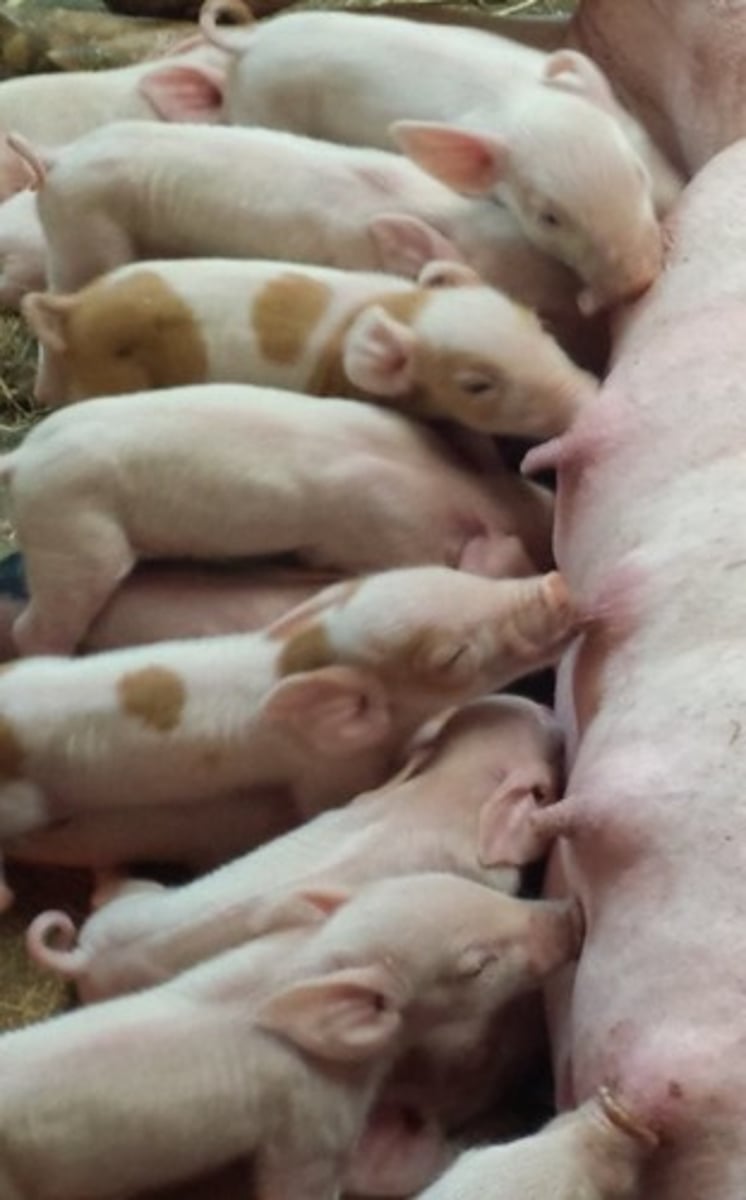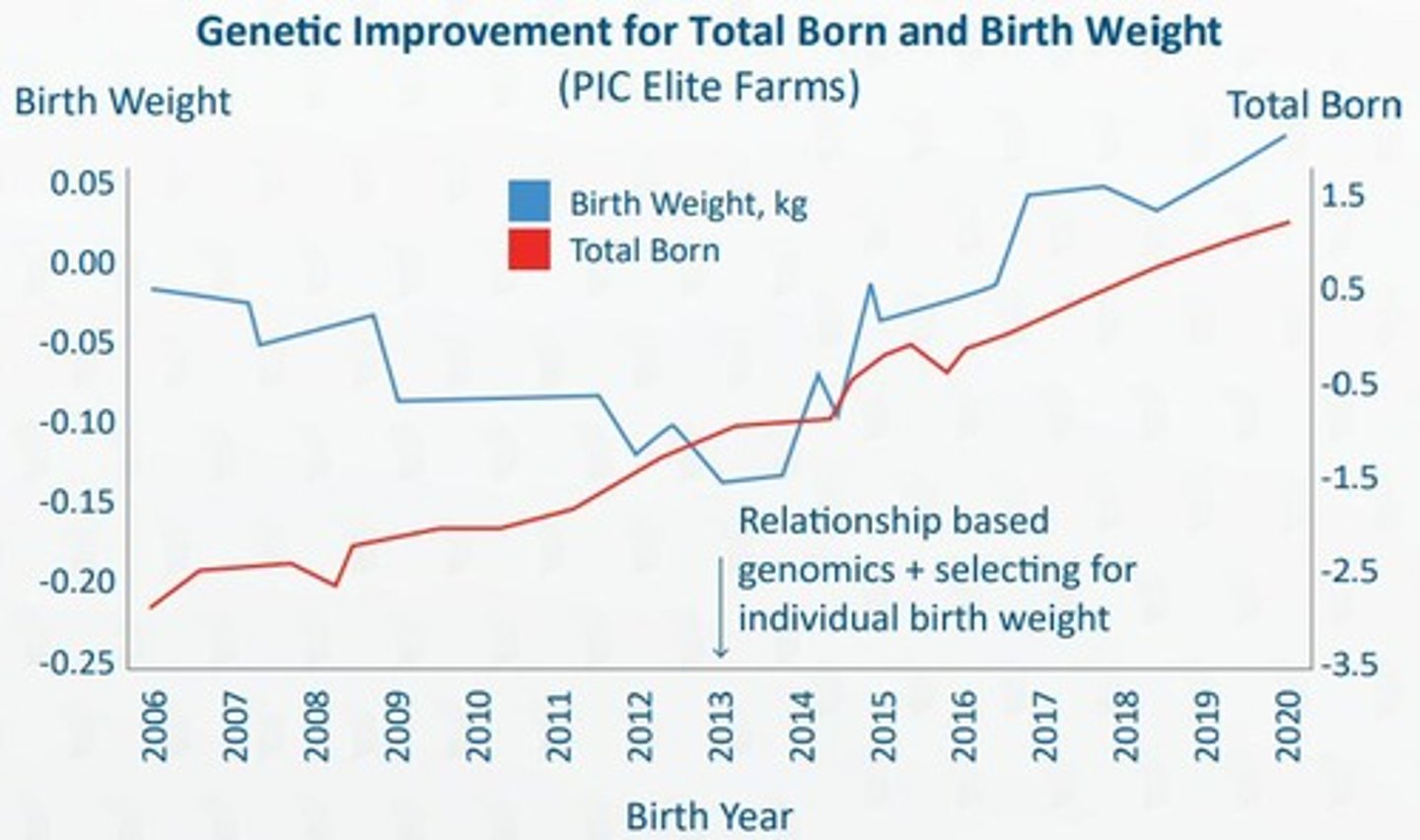Genotypes and Phenotypes Part 1
1/89
There's no tags or description
Looks like no tags are added yet.
Name | Mastery | Learn | Test | Matching | Spaced | Call with Kai |
|---|
No analytics yet
Send a link to your students to track their progress
90 Terms
Genotype
The genetic constitution of an individual.
Phenotype
The observable characteristics of an individual.
Innate behaviours
Behaviours that are genetic and present at birth.
Acquired behaviours
Behaviours that are non-genetic and learned during ontogeny.
Qualitative traits
Traits controlled by one or a few genes that lead to clear variation.
Quantitative traits
Traits controlled by many genes as well as the environment.
Fisher's infinitesimal model
A model explaining quantitative traits.
Heritability
The degree to which traits are passed from parents to offspring.
Mutation
Any change to a gene's DNA sequence; can be positive, negative, or neutral.

Pullet
A laying hen breed aged under 1 year.
Broilers
Chickens raised for meat.

Gilt
A young female pig who hasn't had a litter.
Piglet
A young pig that is still feeding.

Weaner
A piglet over 8 weeks that is no longer suckling.
Hogs
Castrated male pigs.
Boars
Uncastrated male pigs over 6 months.
Calf
A young bovine under 12 months.
Veal
Meat from a calf under 6-7 months.
Young bull
An uncastrated male bovine under 24 months.
Steers
Males that have been castrated.
Heifer
A female bovine under 24 months that has not calved.
Poultry consumption
The average person consumes 35kg of poultry and around 225 eggs per year in the EU.
UK poultry statistics 2024
The number of poultry in England decreased by 1.5% to 129 million.
Broiler chicken proportion
Broiler chickens make up 68% of all poultry.
Turkey increase
Turkey numbers increased by 29% to 3.1 million.
Broiler meat economic contribution
Broiler meat contributes £4.6 billion to the UK economy and supports 100,000 jobs.
Layers
A range of breeds producing eggs of different sizes and colours.
Consumer Market
Different people looking for different things in poultry products.
UK Commercial Poultry Breeding
In the UK, a small number of multi-national companies supply ~90% of broiler breeding stock.
Breeding Pyramid
A method for improving genetic progress in production stock through a structured breeding approach.
Pure Lines
Closely related breeding stock with identical genetic constitution producing a large number of likely identical chicks.
Selection Differentials
The difference between the mean of a population and the individuals selected for breeding.
Generation Intervals
The time taken between generations, which can be low in poultry breeding.
Breeding Objectives for Layer Hens
To obtain the maximum number of saleable eggs per hen at low feed cost with optimal egg qualities.
Traits Recorded in Layers
More than 30 traits are monitored in pure-bred populations.
Breeding Objectives for Broiler Hens
Involves scrutiny of thousands of measurements including breast muscle weight and food conversion ratio.
Public Debate on Broilers
Discussion over rapid weight gain in chickens leading to health complications and shorter lives.
Selection Index
A score based on the estimated breeding value of desired traits for profitability in production.
Profitable Lifetime Index
The additional profit expected from a daughter of a high value bull compared to one sired by an average bull.
Estimated Breeding Value (EBV)
Calculated using thousands of records to assess the genetic potential of an individual.
Economic Importance
The significance of a trait in terms of its financial impact on production.
Heritability
The proportion of variation in a trait that can be attributed to genetic factors.
Genetic Correlations
The relationship between different traits that can affect breeding decisions.
Feed Conversion Ratio
A measure of how efficiently animals convert feed into body mass.
Breast Yield
The amount of breast meat produced by a broiler hen.
Meat Quality
Characteristics of meat that affect its value and consumer preference.
Small Scale Poultry Breeding
Refers to breeding practices for backyard chickens.
Poultry Breeds
280 breeds of poultry; 33 ducks, 23 geese, 24 fowl, 63 miniature fowl, 20 bantam fowl and 8 turkey.
Poultry Registration
There is no pedigree registration or individual identity; in the past only those who had more than 50 birds registered them with DEFRA.
Avian Influenza Impact
Changes with avian influenza have affected the counting of some birds; some birds still not counted, such as parrots.
UK Pig Population 2023
AHDB reported a reduction in the UK pig population in 2023; a reduction of ½ million (10.3%).
Pig Value Increase
Despite the reduction in population, the value of pigs and pigmeat has increased.
Production Cost Pressures
Rising production costs, labor shortages, and global pig crises have increased pressure on pig production.
Cereal Prices
Increase in cereal prices resulting from the Ukraine war, Covid-19 impacts, carbon dioxide shortages, and swine fever.
Global Meat Intake
Globally, pigs make up 36% of the world's meat intake according to FAO.
Vertical Integration in Breeding
Both pigs and poultry tend to fall into a vertically integrated system with rapid rates of genetic progress.
Genetic Progress in Breeding
Rapid transfer of improvements through pyramid to commercial production of crossbred stock.
Artificial Insemination
A technique used in pig breeding to enhance genetic diversity and improve production.

Sire and Dam Lines
There are specialised sire and dam lines with multiple populations of each in commercial pig breeding.
Index Selection
An index selection is derived from performance testing measured in commercial systems with detailed recording of weight and feed intake.
Hyper Prolific Selection
In sows, there is a move towards hyper prolific selection to increase piglet production.
Marker Assisted Selection
In pigs, marker assisted selection typically involves around 30 markers for genetic evaluations.
Genomic Selection
Genomic selection considers all markers for selection in pig breeding.
Breeding Objectives for Pork Production
Characteristics or traits expected include lifetime production, feed efficiency, % lean, growth rates, meat quality, and vitality.
Animal Welfare Consideration
There is now consideration of animal welfare in pig breeding, beyond just production metrics.
Small Scale Pig Breeding
Many individuals keep just a couple or a small number of pigs, often rare breeds or breeds at risk of going extinct.
British Lop
The British Lop is probably one of the rarest pig breeds in the UK.
Native Pig Breeds
There are 11 native breeds in total, all considered rare and at risk.
British Pig Association
An organization that registers purebred individuals, offers pedigree registration services, supports conservation of rare breeds, and stores genes of these breeds.
Dairy Cows in the UK
As of December 2023, there are 2.65 million dairy cows in the UK, with 1.84 million in the milking herd.
Dairy Cows Decline
The number of dairy cows has slightly declined by 1.7%, although milk yield has not.
Global Milk Consumption
The global consumption of cow milk is increasing due to population growth and changing preferences.
Dairy Farms Trend
The number of dairy cows per farm is increasing, indicating fewer but larger farms.
Technological Advances in Dairy
Technological advancements include automated milking systems.
Holstein/Friesian Breeds
Holstein/Friesian are the most common dairy breeds, but there is increasing demand for other breeds with different milk compositions.
Artificial Insemination (AI) in Cattle
The dairy breeding industry uses AI companies and cooperatives to store semen from bulls for artificial insemination.
Progeny Testing
Progeny testing involves testing offspring before they are used for artificial insemination, taking several years to gain information.
Generational Gap in Cattle
The generational gap in cattle can take several years, specifically 6 years, to gather necessary information.
Genetic Evaluation - PTA
Genetic evaluation includes information from all relatives of an individual, expressed relative to the average.
PTA Calculation
Predicted Transmitting Ability (PTA) is calculated as PTA = ½ EBV.
Profitable Lifetime Index (PLI)
PLI measures overall genetic merit and combines PTA into an overall score for an individual.
Indexes for Genetic Evaluation
Different countries have their own indexes for genetic evaluation, reflecting trends in production or fertility.
Crossbreeding in Dairy Cattle
Crossbreeding is increasing in popularity, with most cross breeds marked with an 'X' on their passport.
Registration of Calves
Calves should be registered within 27 days; if lost, the registration needs to be replaced.
Crossbreed Dual Purpose Cattle
There is increased interest in crossbreed dual purpose cattle, especially for keeping all calves born.
Animal Passport
Each animal born receives a passport containing details about it, its sire, and dam, necessary for slaughter.
Ear Tag Identification
The same number found on an animal's passport can be found on its ear tag.
Semen Cost Variation
AI straws vary in cost from a few pounds to 50-60£.
National Breeding Programmes
National breeding programmes share information and hold international records through 'Interbull'.
Independent Milk Recording
Independent milk recording provides widely published genetic evaluations.